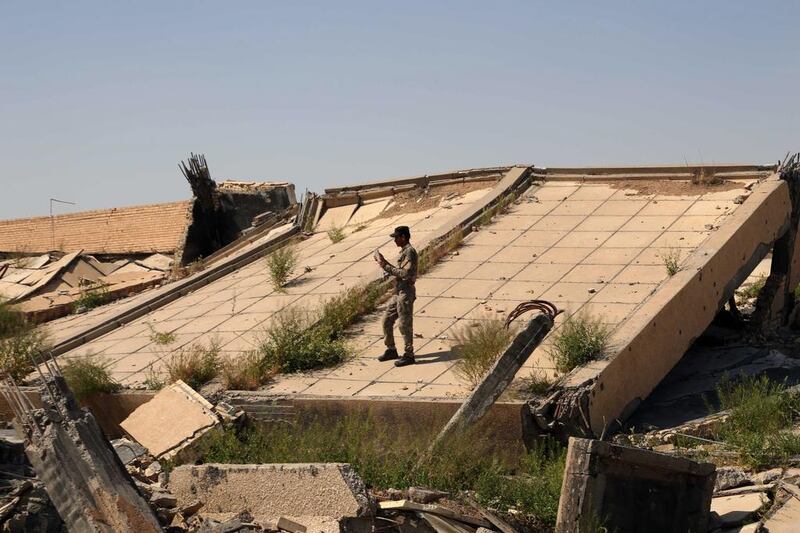BAGHDAD // Iraq put its Tikrit offensive on hold on Monday as senior officials called for more airstrikes to dislodge ISIL militants who have laid explosives across Saddam Hussein’s home city and still hold its central districts.
The offensive, the largest yet against insurgents who swept through northern Iraq in June, has been stalled after Iraqi security forces and mainly Shiite militia pushed into Tikrit last week.
Interior minister Mohammed Al Ghaban said: “We have decided to halt military operations in Salahuddin in order to reduce casualties among our heroic forces ... and to preserve the remaining infrastructure.”
The operation will be on hold until civilians in Tikrit, capital of the mainly Sunni Muslim Salahuddin province, can flee and roadside bombs can be cleared, he said.
“The situation is under control and we will choose the appropriate time to attack the enemy and liberate the area”.
Iraqi forces have struggled to gain further ground against the militants who are holed up in a vast complex of palaces built when Saddam was in power.
Military officials in Tikrit said there was no fighting on Monday in the city that was home to more than 250,000 people before it was overrun last year.
Government forces are in control of most of the northern Qadisiya district as well as the southern and western outskirts of the city, trapping the militants in an area bounded by the river that runs through Tikrit. Though Iraqi forces and allied militiamen may have the insurgents in a chokehold, officials are increasingly citing air power as necessary to drive out the remaining insurgents.
“We need air support from any force that can work with us against ISIL,” deputy minister of defence Ibrahim Al Lami said, declining to say whether he meant from the US-led coalition or Iran, which is playing a role in the assault.
The US-led coalition has been conspicuously absent from the offensive, the biggest to be undertaken by Iraqi forces since ISIL seized around a third of the country last summer including Tikrit.
Meanwhile, Kurdish forces in Iraq are investigating two other possible chemical weapons attacks by ISIL.
The two purported chemical weapon assaults resemble one claimed by Kurdish officials on Saturday that an independent laboratory concluded the militants used chlorine gas against its peshmerga forces in a suicide attack on January 23. Their claims could not be immediately verified by international authorities.
Iraqi officials and Kurds fighting in Syria have made similar allegations about the militants using the low-grade chemical weapons against them. The ISIL group, which controls a third of Syria and Iraq in its self-declared caliphate, has not commented on the claims.
General Aziz Wesi, in charge of a Kurdish special forces brigade, said authorities declined to immediately discuss the two newly announced attacks when they happened out of fear of causing a panic.
Kurdish officials have offered footage of the aftermath of one of the attacks which shows fighters coughing and pouring water over their heads after another a suicide truck bombing that authorities say wounded some 60 men.
“I put a wet scarf on my face because when I saw the gas, I felt it,” said Captain Mohammad Sewdin, who leads the Kurdish special forces unit targeted in the December attack. “I was afraid it might be something like [chemical weapons]. So I told my men to do the same.”
Capt Sewdin said he was temporarily blinded for six hours after the attack and coughed up blood. He and others were hospitalised.
On Saturday, the Kurdistan region security council offered video and lab results it said proved the ISIL group used chlorine in the January 23 suicide truck bomb.
There has been no independent confirmation of any of the Kurds’ claims. Peter Sawczak, a spokesman for the Organization for the Prohibition of Chemical Weapons, which has monitored Syria dismantling its chemical weapons stockpile, said on Monday that no member state had requested an investigation into the Kurdish claims.
“We’re concerned about any allegation of chemical weapons use,” Mr Sawczak said.
There have been several allegations that the ISIL group has used chlorine previously. In October, Iraqi officials claimed ISIL extremists may have used chlorine-filled cylinders during clashes in the towns of Balad and Duluiya in late September. Their disclosures came as reports from the Syrian border town of Kobani indicated that the radical group added chlorine to an arsenal that already includes heavy weapons and tanks looted from captured military bases.
The Kurdish claims came on Monday, the 27th anniversary of the 1988 Halabja massacre, which saw Saddam use chemical weapons on the Kurdish village, killing an estimated 5,000 people.
Peshmerga fighters also recaptured three villages west of Kirkuk from ISIL on Monday with the help of US-led coalition airstrikes, Sheikh Jaafar Barzanchi said.
* Reuters and Associated Press





